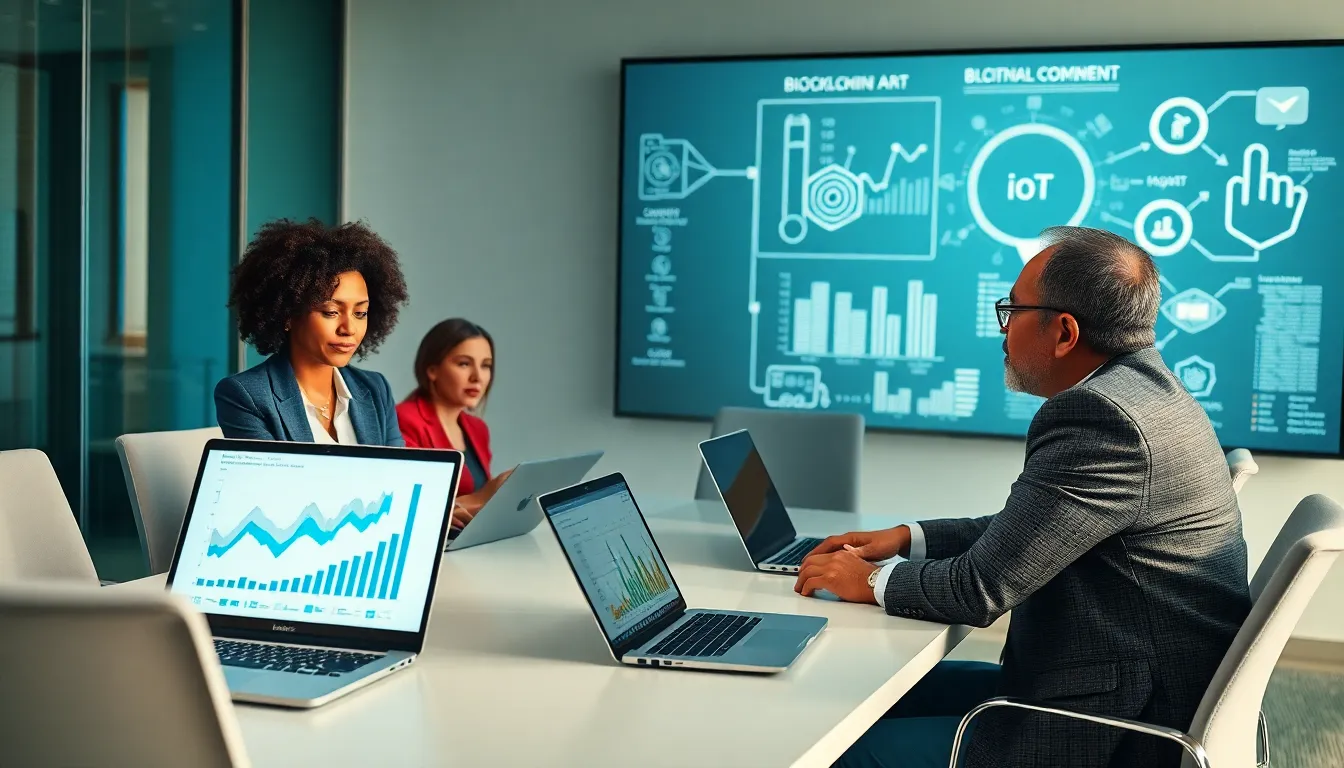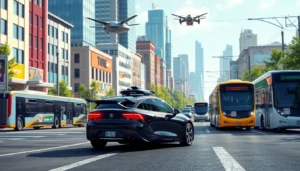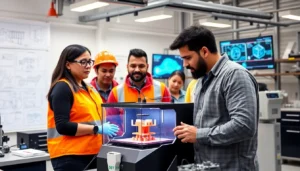Table of Contents
ToggleThe tech revolution isn’t just a buzzword; it’s the rollercoaster ride of the century. Picture this: robots brewing your morning coffee while self-driving cars argue over who gets to park first. It’s a wild world where innovation reigns supreme, and every day brings a new gadget that makes life both easier and a bit more chaotic.
Overview Of The Tech Revolution
The tech revolution represents a significant shift in how society interacts with technology. Innovations unfold rapidly across various sectors. Daily routines are transformed as advanced technologies emerge. Individuals now rely on artificial intelligence to streamline tasks. In this dynamic landscape, smart home devices enhance convenience, often managing multiple functions simultaneously.
Various industries, including healthcare and transportation, witness profound changes. Medical diagnoses benefit from AI-driven analytics, improving accuracy and efficiency. Meanwhile, autonomous vehicles are on the verge of reshaping the way people commute. With the proliferation of mobile applications, users access services at their fingertips. Increased connectivity results from the expansion of the Internet of Things, linking devices in unprecedented ways.
Amidst this excitement, cybersecurity becomes a paramount concern. As reliance on technology grows, so does the need for robust security measures. Strategies evolve to protect sensitive data from unauthorized access. Meanwhile, digital literacy gains importance, empowering individuals to navigate complex technological landscapes.
Sustainability also factors into the conversation. Innovations in clean energy technologies aim to reduce environmental impacts associated with rapid tech growth. Companies prioritize eco-friendly practices, integrating sustainability into their business models.
Overall, the tech revolution is characterized by its fast pace and multifaceted nature. As society continues to adapt, the future promises even more transformative advancements. Embracing these changes fosters resilience and ensures continued progress in an increasingly digital world.
Key Innovations Driving The Tech Revolution

The tech revolution features several groundbreaking innovations fueling its progress. Each innovation plays a critical role in transforming how people interact with technology daily.
Artificial Intelligence And Machine Learning
Artificial intelligence and machine learning lead the charge in innovation. These technologies enable computers to learn from data and make decisions with minimal human intervention. Companies, like Google and Amazon, leverage AI for personalized recommendations, improving user experiences. Significant advancements in natural language processing enhance communication between humans and machines. Tasks once considered complex, such as image recognition and data analysis, now occur rapidly and accurately. AI-driven tools help various sectors, from finance to healthcare, optimize operations and deliver insights that drive productivity.
Blockchain Technology
Blockchain technology represents a notable shift in data management and security. It provides a decentralized ledger system that enhances transparency and trust among users. Industries, such as finance and supply chain management, adopt blockchain to secure transactions and streamline processes. The immutability and visibility of blockchain records ensure data integrity, making fraud and data breaches significantly harder. Various cryptocurrencies utilize blockchain to facilitate transactions, increasing interest in decentralized finance (DeFi). Adoption of smart contracts automates agreements, reducing the need for intermediaries and improving efficiency.
Internet Of Things (IoT)
The Internet of Things establishes a connected environment for devices. Smart home devices, such as thermostats and security systems, offer users enhanced control and convenience. Collecting data from various sources helps organizations optimize operations and improve customer experiences. In manufacturing, IoT solutions streamline processes through real-time monitoring and automation. Connected vehicles deliver data on traffic patterns and vehicle health, paving the way for improved safety. As IoT continues to grow, its integration into daily life becomes more prevalent, promoting greater efficiency and smarter living spaces.
Impact Of The Tech Revolution On Society
The tech revolution has fundamentally changed how individuals and societies operate. Innovations reshape work environments and enhance communication.
Changes In Work Environments
Remote work opportunities surged with the rise of digital tools. Employees often connect from various locations, leading to flexible schedules. Collaboration platforms like Slack and Zoom facilitate real-time cooperation, allowing teams to manage projects efficiently. This shift fosters a greater focus on productivity rather than traditional office hours. Employers now prioritize results over attendance, transforming job expectations. Additionally, automation streamlines repetitive tasks, enabling workers to concentrate on complex problem-solving. The integration of artificial intelligence in hiring processes drives more data-driven decisions. Overall, these changes enhance job satisfaction and improve work-life balance for many.
Transformation Of Communication
Communication underwent a significant overhaul due to digital advancements. The rise of social media platforms shifted interactions from face-to-face to digital channels. Instant messaging apps enable quick exchanges, often replacing traditional calls and emails. Video conferencing tools allow for virtual meetings, connecting people worldwide instantly. Businesses leverage these technologies for marketing and customer engagement, generating direct feedback loops. Inclusivity also improves as individuals from different backgrounds engage online. However, rapid communication poses challenges, including misinformation. Despite these hurdles, technology fosters global conversations that were once impossible, creating a more interconnected society.
Challenges And Concerns
The tech revolution brings notable challenges and concerns that require careful consideration. Despite technological advancements, privacy issues pose significant risks to individuals and organizations alike.
Privacy Issues
Data privacy has emerged as a critical concern in the tech landscape. Increased data collection by companies raises questions about how personal information is handled. A lack of transparency can lead to unauthorized data sharing and potential misuse. Consumers often find themselves unaware of the extent of their data being collected. Regulations like the General Data Protection Regulation (GDPR) aim to address these concerns, but adherence remains inconsistent across industries. Balancing innovation and privacy is essential to maintain public trust and ensure responsible data management.
Economic Disparities
Economic disparities persist and may widen due to the tech revolution. Access to technology and digital resources varies significantly among different socioeconomic groups. While some individuals benefit from automation and digital tools, others face barriers to entry. Inadequate access to high-speed internet limits opportunities for many, particularly in rural areas. Job displacement caused by automation may disproportionately affect low-wage workers, creating further economic challenges. Ensuring equitable access to technology and training will play a vital role in bridging these gaps. Addressing these disparities fosters a more inclusive tech landscape that benefits everyone.
The Future Of The Tech Revolution
Emerging technologies promise to redefine how society engages with daily life. Artificial intelligence and machine learning will continue to evolve, allowing for greater automation and efficiency in everyday tasks. Innovations in natural language processing enhance interactions across devices, simplifying communication between humans and machines.
Digital transformation in sectors such as healthcare will likely deepen, with AI-driven tools significantly improving diagnostic accuracy. Autonomous vehicles may become a common sight, revolutionizing urban landscapes and commuting patterns. Smart home devices will integrate seamlessly, creating a connected ecosystem that optimizes convenience and efficiency.
The expansion of mobile applications will improve accessibility to services, ensuring users can navigate complex systems with ease. Blockchain technology is anticipated to play a crucial role in data management, promoting transparency and security in transactions. Industries will benefit from decentralized systems that bolster trust among participants.
Cybersecurity challenges will persist, necessitating stronger protective measures to ensure data safety. Individuals must cultivate digital literacy, equipping themselves to maneuver through rapidly changing technology landscapes. Organizations will prioritize sustainability, focusing on renewable energy sources and eco-friendly innovations to minimize their environmental impact.
Remote work is expected to solidify its place in the workforce, as flexible schedules enhance productivity and employee satisfaction. Collaboration tools will foster seamless teamwork, while automation will handle mundane tasks, freeing employees for more engaging responsibilities. Social media and instant messaging will keep transforming communication, reinforcing global connections.
Privacy concerns will remain paramount, particularly with extensive data collection practices. Regulatory frameworks like GDPR aim to protect personal information, yet compliance presents ongoing challenges. Inequities in technology access will demand attention, as financial barriers continue to affect economically disadvantaged communities. Ensuring equitable access to technology and resources is vital to cultivating an inclusive future in the tech revolution.
The tech revolution is reshaping every aspect of life and society. As innovations continue to emerge they promise to enhance efficiency and connectivity. The integration of AI and smart technologies is transforming industries while offering unprecedented convenience.
However challenges like privacy concerns and unequal access to technology must be addressed. Ensuring that everyone benefits from these advancements is crucial for fostering an inclusive future. As individuals adapt to this rapidly changing landscape they must embrace digital literacy and remain vigilant about security.
With the potential for even greater transformations on the horizon the tech revolution is just beginning.







